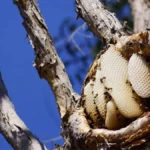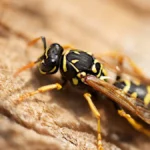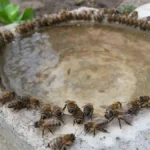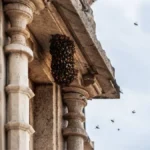There are very few times when it is actually a good idea to kill bees. If you do have to kill bees, using a pesticide-free method at least helps a bit. Killing bees with soapy water is an option if it is needed. I hate killing bees, but in this article we will have a look at a few ways to do this humanely if you really have to.
Why Do You Need To Kill Bees?
I’m working on the assumption that you have some bees that are causing trouble and you need to get rid of them. This article will look at a few options that can allow you to kill bees including killing bees with soapy water.
IMPORTANT NOTICE:
Bees, wasps, and hornets will fight back and win most of the time if you do not know what you are doing. Killing bees with soapy water or any other method should be a last resort. Let’s have a look at circumstances where you may, with limited skill and equipment, be able to kill problem bees and wasps. We will also look at a few examples of times when you should call in a professional.
Killing bees and wasps is generally not a good idea – if you can remove them in another way, that is always better.
Top 5 Reasons We May Need to Kill Bees
Reason To Kill A Few Stray Bees In House
You have a few stray bees in the house and you are worried your wife/kid/dog/cat/hamster/parrot/goldfish/husband will get stung. Bee stings to unsuspecting house dwellers can cause terrible disruptions to life. I actually lost one of my cichlid fish to a bee sting once – a bee flew into the fish tank and the fish ate it, got stung, and died. Bizarre.
Often, these bees will have been attracted to a jar of honey near a window, or some other sweet thing. Close the window. Then progress to the solution.
Solution: The Most effective way to remove a few problem bees is with a vacuum cleaner. Your risk of being stung is very low with this method. Remove the head of the vacuum cleaner and just use the pipe. Bees will be sucked away, and you can then turn the vacuum cleaner off. Killing bees with soapy water in this case is unnecessary and will just create more mess than is needed.
Reason to Kill A Small Swarm is in a Dangerous Place
A small swarm the size of a fist is hanging in a place where it could cause trouble. You cannot find a beekeeper to remove these and it is an emergency that you need to get rid of them.
Solution: If you prepare a soapy water solution and place it in a spray bottle – 1 teaspoon of dishwashing liquid. You can spray the cluster of bees when it is dark – do not use a light to view the bees – they will fly towards the light. Spray the bees until they are very wet. They will die in a few minutes. Vacuum the dead bees up. If it is a very small cluster you can skip the soapy water and just vacuum the bees up. Killing bees with soapy water in this way is a low-risk method to solve a problem.
Reason to Kill A Larger Swarm of Bees
If you do not know anything about bees, call a beekeeper. There is nothing you can do to safely deal with a larger swarm. The risk of stinging and catastrophe is high with a bigger swarm. I have seen people do silly things such as trying to spray swarms with bug spray – this resulted in the bees going crazy and singing three dogs to death and almost killing a postman.
Solution: Call a beekeeper to remove a larger swarm. If you are a beekeeper, the chances are you are not reading this article, but, if you are, get a box and dump the bees in the box. Take them somewhere useful. You know the drill. Killing bees with soapy water is not an option here. It will go wrong.
A Beehive That Has Moved Into A Wall, Or Other Structure
Once a swarm has moved into a space, there is no way a person without beekeeping knowledge can safely remove these bees. Bees that have formed a hive get strong quickly. Once a hive is established it can, if angered, field anywhere from 10 000 to 40 000 angry workers that will emerge in a cloud and seek and sting anything which moves. This is a really bad situation and people and animals can die.
I have been called in on many occasions to repair home “bee removals” by non-beekeepers. One guy poured gasoline into the hive and set it alight. The gasoline poured down a hole and did not even enter the beehive. When he lit the gasoline it created an explosion that destroyed a fence (hollow wall fence) and burnt a tree and a garden shed to the ground. The bees became irate and the fire department refused to put out the fire. I arrived and had to operate the fire hose to put out the tree, and then calm the bees. Very unpleasant.
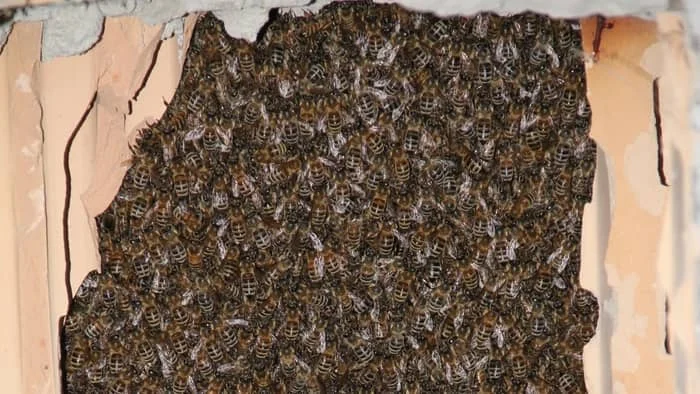
Learn more about: How To Remove A Honey Bee Nest Without Killing Them
Solution: For an established hive, call a beekeeper to remove the bees. This is beyond the scope of a home DIY solution as the bees are genuinely dangerous and can cause significant damage and legal liability to you if something goes wrong.
Why Does Soap Water Kill Bees?
Killing bees with soapy waterworks in a very simple way. Bees, like us, breathe air so as to absorb oxygen to drive metabolism. The system involves a number of small holes in the side of the bee called spiracles – these holes allow oxygen into a system of small tubes that move oxygen and air deep into the bee. From here oxygen diffuses into the bee to allow metabolism. For more on how this system works read this article I wrote.
When we mix soap with water it reduces the surface tension of the water. Water has very high surface tension, and this means that if a bee gets wet, the water does not easily penetrate the spiracles and drown the bee. However, if we mix soap into the water, we reduce the surface tension, and the water can penetrate the spiracles. This means that the bee quickly breathes water – and as with most things that breathe air – this causes death quite quickly.
What Kills Bees Instantly?
Fire is the only thing I have seen which can kill an entire hive instantly. However, fire will also more often than not get out of control and cause a lot of damage.
There are a few things that can help to reduce the activity of a hive that has gone crazy – the best I have used is in fact a carbon dioxide fire extinguisher. Note that this is a carbon dioxide extinguisher – not the type that sprays white powder or foam. The straight carbon dioxide extinguisher leaves no residue on the bees and they will recover later when they warm up.
This produces a jet of cold carbon dioxide gas – when directed into a beehive that has become very irate, the temperature reduces the bee’s ability to fly and the carbon dioxide stuns them. Within twenty to thirty seconds of directing the jet of cold gas at the hive, the activity of the bees will drop drastically. The colder temperatures also interfere with the ability of the bees to respond to alarm pheromones.
What Happens If You Spray Bees With Water?
I have seen people try this when beehives get irate. If you spray the bees with a powerful jet of water it does nothing other than make the hive angrier. However, if you use a sprayer that sprays a rain of fine droplets these make the bee’s wings wet and you can spray angry bees out of the air. I would suggest that such activities are not for the faint-hearted – when bees get angry, they will manage to sting you even if you are armed with a sprayer.
If you have a situation where for instance bees are attacking horses or chickens, this can help. I have managed to save a chicken coop once by spraying bees into submission like this.
Killing bees with soapy water is an option if you have an emergency. I hope this article has helped you work out when you can use this method, when to use other methods and when to call a professional. If you enjoyed please share.
FAQs
Why would I need to kill bees?
Killing bees should be a last resort, but in certain situations—such as when bees pose a threat to humans, pets, or property—it may be necessary. It’s important to assess the situation carefully and explore relocation or removal options before considering lethal methods.
How does soapy water kill bees?
Soapy water reduces the surface tension of water, allowing it to enter the bee’s spiracles (breathing holes). This causes the bee to suffocate and die quickly, making it an effective pesticide-free method.
Is killing bees with soapy water humane?
While no method of killing bees can be considered entirely humane, soapy water is relatively quick and causes less suffering compared to other chemical-based methods. However, relocation or professional removal is always the preferred approach.
What kind of soap should I use to kill bees?
Regular dish soap mixed with water works best. A solution of about one teaspoon of soap per cup of water can effectively kill bees when sprayed directly onto them.
Can I use soapy water to kill wasps or hornets?
Yes, soapy water works similarly on wasps and hornets, although they may require larger quantities or multiple sprays due to their different body structures and more aggressive nature.
Is using soapy water on bees safe for the environment?
Yes, soapy water is a pesticide-free option, and it doesn’t leave harmful residues. However, be mindful of where you spray it, especially near plants or water sources, as it may affect beneficial insects and aquatic life.
Will soapy water kill an entire beehive?
No, soapy water is effective for small clusters or individual bees, but it is not recommended for entire hives. Killing a large number of bees with soapy water is difficult and dangerous. For larger swarms or hives, contact a professional beekeeper for safe removal.
What should I do if I have a large bee swarm or hive?
For large swarms or hives, it is best to contact a local beekeeper or pest control specialist. Attempting to kill or remove large numbers of bees can be dangerous and is not recommended for those without experience.
Can I prevent bees from becoming a problem without killing them?
Yes, preventative measures like sealing entry points to your home, keeping sweet foods covered, and maintaining your property can help reduce the likelihood of bees settling near you. If bees are already present, always consider contacting a professional for non-lethal removal options.

Dr. Garth A. Cambray is a Canadian/South African entrepreneur and beekeeper with 28 years of experience in apiculture and specializes in adding value to honey. His Ph.D. research developed a new advanced continuous fermentation method for making mead that has resulted in a number of companies globally being able to access markets for mead. His company, Makana Meadery, exports honey mead to the USA where it is available to discerning connoisseurs. He has also developed technologies to commercially manufacture organic honey vinegar in Zambia for export globally. He holds a few patents globally in the ethanol industry and believes in technology and knowledge transfer for human development and environmental sustainability. One of his proudest achievements is the fact that the wind farm he started at one of his old apiary sites has essentially made his hometown carbon neutral.


